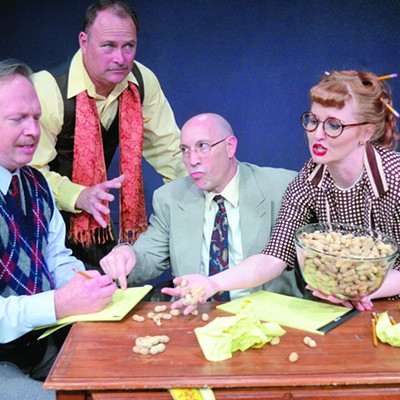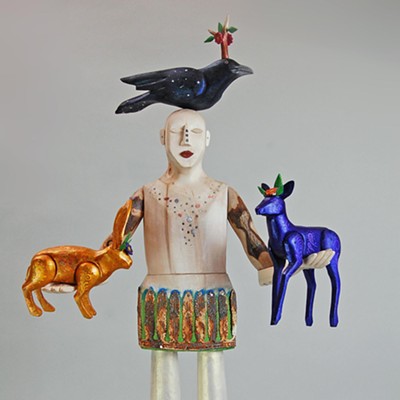Views From the Water Truck
A 10-Year Perspective of Humane Borders
7 p.m., Monday, Feb. 14
Oro Valley Library
1305 W. Naranja Drive
742-3774;
Humane Borders started out 10 years ago with a handful of volunteers and a few barrels of water. Now the booming organization with more than 1,500 volunteers is moving beyond its roots and informing the public about humanitarian issues concerning the U.S.-Mexico border.
"Most of the stuff you hear about the border has to do with police and politicians," says Karl Tucker, a Humane Borders board member. "You don't hear about the humanitarian side."
Tucker will present an account of border issues from that side at a special talk on Feb. 14.
Hosted by the Democrats of Oro Valley, the presentation will feature Tucker and members of the public discussing decreased migration and increased death along the Mexican border.
Tucker says about 300 migrants die in the Arizona desert each year crossing from Mexico to the U.S. It's a number Humane Borders is fighting to lower each time the group goes to work, he says.
Humane Borders has close to 100 water stations set up along the border to help curb the number of migrants who die of thirst along their desert trek. Driving around with 300 gallons of water in each truck, volunteers service the barrel locations on a regular basis, Tucker says.
Humane Borders sees its fair share of opposition; some detractors go to extreme measures to show they do not approve of the organization's efforts.
Tucker says having tires slashed and holes cut into the barrels are not uncommon for Humane Borders.
"We're a venerable target. If you're going to be in this business, you better be in it for the long haul," he says. "And we are."
The event is free and open to the public.—S.B.
Doggone Good Fun
Humane Society of Southern Arizona benefit
Noon to 3 p.m., Saturday, Feb. 12
Casas Adobes Plaza
7001-7153 N. Oracle Road
321-3704, ext. 164;
Saturday, Feb. 12, is going to be a big day for the dogs of Tucson. From noon to 3 p.m., Casas Adobes Plaza will be overrun by canine companions. Paws in the Plaza is an event held to benefit the Humane Society of Southern Arizona. Now in its fourth year, there are numerous new and fun things to check out.
"The main event this year is going to be our Doggy Speed Dating mixer," writes Sara Gromley, public relations coordinator at the Humane Society, in an e-mail.
Participants will spend a few minutes with each dog, reading descriptions to get to know him or her. The speed dating is in perfect coordination with Valentine's Day, and Gromley says it's a good opportunity for people to get to know dogs who need homes.
And speaking of adoptable dogs, there will be a dozen at the event.
Even if you're not looking to adopt a new pup right now, Paws in the Plaza provides more than just an adoption opportunity. It's a chance to shop at pet-friendly vendors, including the Humane Society's own store, Pawsh. In addition, there will be a high-stakes raffle, with the top prize a $1,000 shopping spree at Casas Adobes Plaza.
Digital Muzzle Photography will also be there, taking professional pet photographs for a suggested $10 donation.
"One hundred percent of all raffle ticket purchases and portrait purchases from Digital Muzzle Photography will benefit the Humane Society of Southern Arizona," says Gromley.
The money brought in by events like Paws in the Plaza is what helps the Humane Society care for so many animals every year.
"Paws in the Plaza is a wonderful way to spend the day with two-legged and four-legged loved ones, all for a great cause," says Gromley.—A.G.
Border Crossing
Discussion of Urrea's Into the Beautiful North
4:30 to 6 p.m., Wednesday, Feb. 16
First United Methodist Church
915 E. Fourth St.
622-6481;
It's a story about sneaking across the border, but not in the way you might think.
Abandoned by men who have moved to the United States, a Mexican woman and her friends decide to illegally cross over into the U.S., not to live in the States, but rather to claim their men and drag them back to Mexico to their village.
This is the plot of Into the Beautiful North by Luis Alberto Urrea. The issues the novel raises are the focal point of a Feb. 16 discussion presented by UA Reads, a UA reading program.
The book explores the idea of place as an identity and how sometimes the lines between one world and the next are not as clear as the lines on a map, says Damian Baca, the UA assistant professor of English leading the discussion.
"It could be a bridge between the beginning and end of Latin America," he says. "It blurs these regions."
Although questions of immigration are bound to pop up during the talk, the novel presents the issue of border migration in an unthreatening way, says Gail Kamaras, coordinator of the event.
"Immigration is a very hot issue right now," she says. "But this book, it's humorous and sad. The women are just trying to bring their men back."
Having assigned the book in one of his classes, Baca is familiar with the story and says he believes the novel helps to partially de-politicize an issue that has Arizonans frequently riled up.
Lest discussion-goers think Into the Beautiful North is a novel highlighting the U.S., Baca is quick to point out that the story is just as much about Mexican life and living south of the border.
"It invites multitudes of perspective on life on both sides of the border," he says. "It brings humanity to the narrative of migration."
The discussion is free and open to the public.—S.B.
Flicks and Tunes
Music Is the Weapon Documentary Series
6 p.m., every Sunday in February
Dry River Collective
740 N. Main St.
Even though Aliyah Isageora has been involved with Dry River for about three years, she's hosting her first documentary film series, and it's shaping up to be a good one.
Every Sunday this month, Dry River is home to a documentary series about various bands. Last Sunday, Feb. 6, the series kicked off with Instrument, a film about the band Fugazi. On the following Sundays, in order, the movies will be Along the Way (Bad Religion), We Jam Econo (The Minutemen) and Music Is the Weapon (Fela Kuti).
The collective has hosted documentary series before, but Isageora feels the movie nights were lacking something.
"(I thought), 'We should bring people in and get them thinking,'" says Isageora. In order to do that this time, the movies will be followed by discussions about the bands they feature, with the idea of music being used as a source of power.
"Those bands ... are bands young people relate to," says Isageora.
Seeing the movement and action that came out of those bands can be inspiring, especially for a younger generation. That is one of the ideas that the movies communicate, and something that the discussions could focus on.
"Music is really action against tyranny and control and despair," Isageora says. "I see it as a tool for people to come together and communicate, and get down to true feelings."
Isageora wants to tie these ideas together for people. She says she hopes that people will come to watch all of the movies, and be able to participate in the discussions.
"(Music) is a very unifying thing," says Isageora. "And unity can give strength."
There is a suggested donation of $3, and popcorn and tea will be served. Doors open at 5:30 p.m.—A.G.








